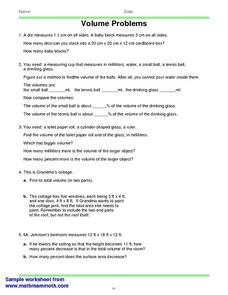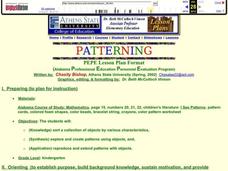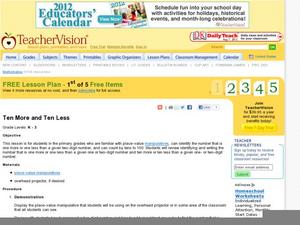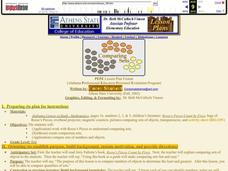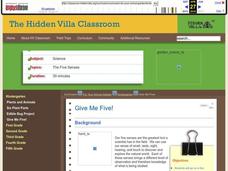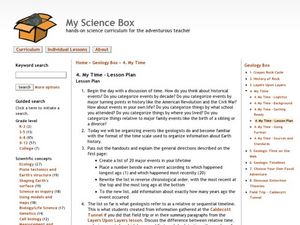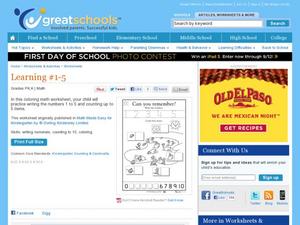Curated OER
Science Lesson #2
Fourth graders explore and experiment with objects that float to see if they float differently in salt water or fresh water. After the experiment, they write a paragraph in their science journal explaining how fresh water and ocean water...
Math Mammoth
Volume Problems
In this volume problem instructional activity, students determine the volume of various objects. They compare similar objects and determine the percent of increase and decrease of the surface area and volume. This one-page instructional...
Curated OER
Ten
Students create their own counting book and brainstorm ideas with each other for a concept. In this counting lesson plan, students first read books such as Ten by Keith Haring.
Curated OER
Patterning
Students sort collection of objects by various characteristics, explore and create patterns using objects, and reproduce and extend patterns with objects.
Curated OER
Classification
Learners investigate how different types of food can be classified then counted. In this sorting, arranging, and classifying lesson plan, students explore how to group foods based on commonalities. Learners are asked four questions which...
Curated OER
Ten More and Ten Less
Get learners to analyze two-digit numbers based on place value, and use manipulatives to add and subtract both 1 and 10. A place value chart is available, and you can project it during guided practice. Through visualizing...
Curated OER
Anchoring Numbers to Five and Ten
Students complete activities to relate numbers to each other. In this number connection lesson plan, students count number sets, count forward and backward, and complete other number recognition activities to learn how numbers are related.
Curated OER
Five Little Frogs
Students use music to study concepts in math. In this music math lesson, students sing songs, read books, and learn counting skills in frog themed activities.
Curated OER
One, Two Jumping Fish
Students watch video segments of counting fish. They participate in counting fish in an activity.
Curated OER
Numbers Up
Students use Legos to build representations of a variety of numbers. They then sort and order their representations and pair them with the written number.
Curated OER
Number Story Arrays
Use these number story cards to give scholars practice with arrays and number models. There are 12 cards here, each with a simple object scenario for learners to apply mathematically. Mathematicians are given the number of rows and how...
Curated OER
Play I Spy: In the Bathroom
Usually playing I Spy in the bathroom causes trouble, but not in this worksheet! Little readers look for objects that begin with the letters b and t. They circle the objects in the picture, count how many of each they found, and write...
Curated OER
A Mass of Pennies
Learners estimate and determine the number of cents (pennies) that are needed to equal the mass of a variety of common objects. They develop a process for measuring and explore concepts related to units of measurement.
Bowels Physics
Impulse and Momentum
Be impulsive with your high school physics class. Emerging physicists review the slide presentation and learn about impulse, momentum, collisions, and how each variable may be affected. They complete practice problems and conclude with a...
Curated OER
Comparing Sets
Kindergarteners and first graders work with Reese's Pieces to explain comparing sets, create comparison sets, and compare sets of numbers and objects. A good activity that uses a "tasty" manipulative!
Curated OER
Shapes and Tools
Young learners view different shapes drawn by the teacher on the board. The teacher identifies each shape by name and discusses the importance of knowing the difference between shapes when building something. The pupils complete the...
Curated OER
Spoonfuls, Cupfuls and Handfuls
Explore the use of non-standard units for measuring volume with elementary learners. They fill a container and count the number used using cups, spoons, and bottles, build with blocks and count the number of blocks used, and compare and...
Curated OER
Give Me Five!
Students become familiar with their five senses and how their experiences would change without them. In this observations lesson, students observe using their five senses in a garden. Students illustrate what they've observed...
Curriculum Corner
“I Can” Common Core! 1st Grade Math
Any first grader can master the Common Core math standards with this checklist! With each standard rewritten as an affirmative I can statement, children are provide with clear goals to work toward throughout the school...
Curated OER
Recognizing 3-Dimensional Shapes
Three-dimensional shapes are all around us; expose young geometers to this concept as they focus on identifying four figures: cube, prism, sphere, and pyramid. Learners begin by matching four objects to the shape each...
Curated OER
My Time!
Learners explore how to tell time by looking at their daily schedule. Everyone's days start out the same (with school), but what does each learner do after school? How do they spend their time?
Curated OER
Sorting Candy
Lower graders sort and group objects by their different properties. They watch a video about sorting then, sort and organize candy in different groups. Students compare how others sorted their candy. Finally, they decide which group has...
DK Publishing
Can You Remember? Learning #1-5
Start from the beginning with new counters! They practice number concepts, tracing five digits: 1, 2, 3, 4, and 5. Next, scholars count the number of each object in an illustrated pond scene. How many suns? How many ducks? There are five...
Curated OER
Further Investigating Greater Than, Less Than, and Equal to
Students investigate number relationships such as greater than, less than, and equal to. In this number relationship lesson, students use number mats and a fish with a large, open mouth to practice showing number relationships.

